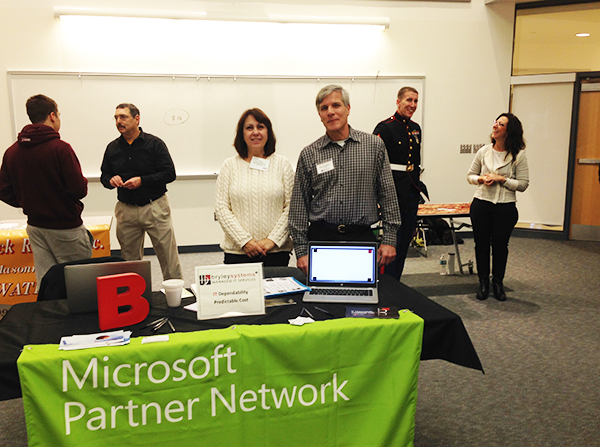The crystal ball is still foggy, but here are my thoughts on Microsoft versus Google and (what I believe is) the battle for world domination. (Microsoft sales are around $77B, primarily from Windows software (25%), business software (32%), and server software (25%); Google is about $55B with approximately 87% of its revenue from advertising.)
Notice, I did not include Apple: The big play is between Microsoft and Google and it is occurring across multiple lines:
- Google (search) versus Bing
- Microsoft Office versus Google Apps
- Google Android versus Microsoft Windows
Google (search) versus Bing
In the search-engine market, there is no comparison with Google (#1) capturing an average of 67% of monthly queries in the US while Bing (#2) captures only 17%. In search, queries equate to advertising revenue, the heart of Google’s success. (Search is currently not a significant part of Microsoft’s sales.)
Google’s familiar, plain-white background seems functional, but also trendy with the occasional changes to the GOOGLE moniker. Bing’s full-screen, image-based background usually displays beautiful vistas or current events; the scrollable “Popular Now” bar across the bottom adds an items-of-interest aspect.
Bing (aka Microsoft) suggests comparing the two.
Winner (by a wide margin) is Google; Bing is interesting, but it will take some major work to break Google’s dominance in this area.
Microsoft Office versus Google Apps
When it comes to productivity applications; Microsoft Office 2013 owns the market at 92% while the newer Office 365, Microsoft’s Cloud-based answer to Google Apps, exceeds $1B per year. (For details, please see the April 19, 2013Forbes article athttp://www.forbes.com/sites/greatspeculations/2013/04/19/microsoft-shakes-off-pc-slump-as-office-and-servers-sales-swell/.)
Microsoft continues to focus on Office 365; pricing now starts at $96 per year, new features have been added, and partners can sell this service directly to users.
Although Microsoft productivity applications dominate on the desktop, Google Apps is a serious contender to Office 2013 and Office 365 with an estimated 33% to 50% share of Cloud-based productivity apps. The primary difference: Google Apps was Cloud-based from the start; it doesn’t have all of the features of Microsoft Office, but is relevant on more platforms, is free to consumers, and costs just $50 per
year for users of Google Apps for Business.
So, Google Apps plays well in a heterogeneous, consumer/small-business world. Also, Google has moved its popular Postini anti-spam service into Google Apps, a move that has angered and confused many of its (former) Postini clients, but one that makes sense from the perspective of beefing up Google Apps for Business to battle against Office 365.
For details, please see the 4/23/2013 article by Kurt Mackie of Redmond Magazineat http://redmondmag.com/articles/2013/04/23/gains-for-google-in-cloud-office.aspx?sc_lang=en. To compare Office 365 to Google Apps, please visit http://www.youtube.com/watch?v=gBtYFM6Zy0o
Winner (by a strong, but potentially diminishing margin) is Microsoft; Microsoft dominates the desktop, but mobile users are changing the landscape.
Google Android versus Microsoft Windows
In terms of projected sales of mobile devices, Google’s Android (DROID) owns the market at 79% while Microsoft Windows is at just 3.3%. However, if you include desktop computers, a declining market, Windows is still prevalent across organizations throughout the world.
Google introduced Android in 2007; it is a Linux-based, open-source operating system designed for touchscreen devices. Its strength is its robustness and ease-of-use, which led to a brisk rate of adoption by users and application developers.
Windows 8 was introduced in October of 2012. It was designed to be compatible with its predecessors (Windows XP and Windows 7) while introducing a touch-enabled, tile-based, user interface that has been more frustrating than enabling. To date, it has failed to meet even modest expectations. (Windows 8.1, a free, significant upgrade to Windows 8, will release on October 17th with the hope of changing this trend.)
Currently a draw if you include both mobile devices and desktop computers: Microsoft owns the desktop while Google owns mobile devices; Windows 8.1 provides hope, but might be too little too late to penetrate the mobility market.
If nothing else, expect prices to decrease as the competition heats up.








